常见动词不定式词组
- 格式:doc
- 大小:46.50 KB
- 文档页数:4

动词不定式的用法有哪些?动词不定式在中学英语中应用非常广泛,一方面在句中可起名词、形容词或副词的作用,同时也可在句中作主语、宾语、定语、状语和宾语补足语。
动词不定式的形式是:to +动词原形,但to有时要省去。
而动词不定式在具体运用时用不用to,取决于谓语动词的用法。
现就以下几方面介绍如下:一、不定式结构1. 带to的不定式结构能直接跟带to的不定式结构的动词主要有:want, expect,plan,begin,start,ask, tell, hope, learn, try, decide, forget, remember, like, love, stop, go, come等。
如:I want to go to the movies with you. 我想跟你一起去看电影。
Don’t forget to turn off the light before you leave.在你离开之前别忘了关灯。
注意:动词不定式的否定形式是在不定式前直接加not,即not to do sth.。
如:Dave told me not to wake up Kate. 大卫告诉我别叫醒凯特。
2. 不定式有时和一连接代(副)词一起构成宾语。
如:I don’t know what to say.我不知道说什么。
3. 不带to的不定式结构以下几种情况使用不带to的动词不定式:(1)在固定词组had better之后。
注意:had better的否定形式是had better not do sth.。
如:You had better go home now. 你最好现在回家。
It’s cold outside. You’d better not go out. 外面很冷,你最好不要出去。
(2)在let, make, see, feel, watch, hear,have等感官或使役动词后,要跟不带to的动词不定式作宾语补足语。

千里之行,始于足下。
常见动词不定式词组、句型用法总结动词不定式是英语语法中的一种形式,由动词原形前加上“to”构成。
动词不定式可以用作名词、形容词或副词,经常用于各种不同的句型和用法。
下面是一些常见的动词不定式词组和句型用法的总结。
1. 动词不定式作主语:例如:To learn a new language is challenging.翻译:学习一种新语言是具有挑战性的。
2. 动词不定式作宾语:例如:I want to go to the beach.翻译:我想去海滩。
3. 动词不定式作形容词的补语:例如:I am happy to help you.翻译:我很兴奋挂念你。
4. 动词不定式用于感官动词后面,表示感受:例如:I saw her cry.翻译:我观察她哭了。
5. 动词不定式用于情态动词后面,表示推想或必要性:例如:He must be busy.翻译:他肯定很忙。
6. 动词不定式用于形容词后面,表示缘由:例如:She was happy to hear the good news.第1页/共3页锲而不舍,金石可镂。
翻译:她听到好消息很兴奋。
7. 动词不定式用于介词后面:例如:I am interested in learning English.翻译:我对学习英语很感爱好。
8. 动词不定式用于短语动词的后面:例如:She wants to give up smoking.翻译:她想戒烟。
9. 动词不定式作定语,修饰名词:例如:He is a person to trust.翻译:他是一个可以信任的人。
10. 动词不定式用于条件句中,表示将来的可能性:例如:If you study hard, you will pass the exam.翻译:假如你努力学习,你会通过考试。
11. 动词不定式用于否定句中,表示不行能或不允许的行为:例如:He refused to eat the vegetables.翻译:他拒绝吃蔬菜。

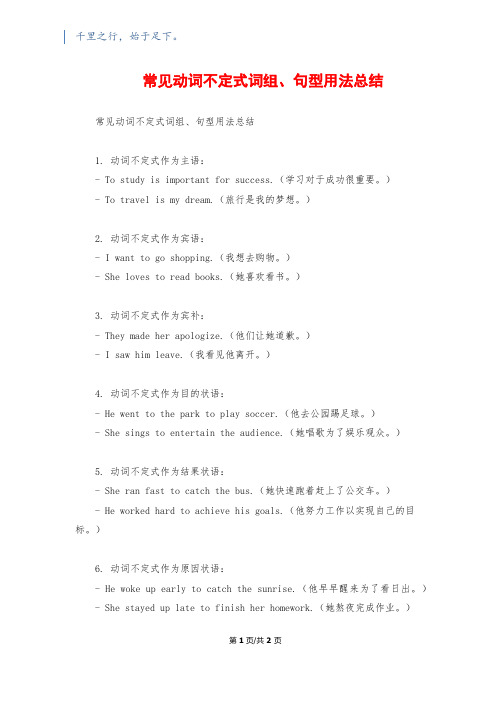
千里之行,始于足下。
常见动词不定式词组、句型用法总结常见动词不定式词组、句型用法总结1. 动词不定式作为主语:- To study is important for success.(学习对于成功很重要。
)- To travel is my dream.(旅行是我的梦想。
)2. 动词不定式作为宾语:- I want to go shopping.(我想去购物。
)- She loves to read books.(她喜欢看书。
)3. 动词不定式作为宾补:- They made her apologize.(他们让她道歉。
)- I saw him leave.(我看见他离开。
)4. 动词不定式作为目的状语:- He went to the park to play soccer.(他去公园踢足球。
)- She sings to entertain the audience.(她唱歌为了娱乐观众。
)5. 动词不定式作为结果状语:- She ran fast to catch the bus.(她快速跑着赶上了公交车。
)- He worked hard to achieve his goals.(他努力工作以实现自己的目标。
)6. 动词不定式作为原因状语:- He woke up early to catch the sunrise.(他早早醒来为了看日出。
)- She stayed up late to finish her homework.(她熬夜完成作业。
)第1页/共2页锲而不舍,金石可镂。
7. 动词不定式作为条件状语:- If you want to succeed, you must work hard.(如果你想成功,你必须努力。
)- You have to practice every day to improve your English.(你必须每天练习才能提高英语。
)8. 动词不定式作为伴随状语:- She listened to music to relax.(她听音乐放松。

动词不定式的用法总结动词不定式在中学英语中应用非常广泛,一方面在句中可起名词、形容词或副词的作用,同时也可在句中作主语、宾语、定语、状语和宾语补足语。
接下来为大家提供了以下:动词不定式的用法总结一动词不定式的形式一般是to +动词原形,但to有时要省去。
而动词不定式在具体运用时用不用to,取决于谓语动词的用法。
现就以下几方面介绍如下。
一、不定式结构1. 带to的不定式结构能直接跟带to的不定式结构的动词主要有:want, ask, tell, hope, learn, try, decide, forget, remember, like, love, stop, go, come等。
如:I want to go to the movies with you.我想跟你一起去看电影。
Don’t forget to turn off the light before you leave.在你离开之前别忘了关灯。
注意:动词不定式的否定形式是在不定式前直接加not,即not to do sth.。
如:Dave told me not to wake up Kate.大卫告诉我别叫醒凯特。
2. 不带to的不定式结构以下几种情况使用不带to的动词不定式:(1)在固定词组had better之后。
注意:had better的否定形式是had better not do sth.。
如:You had better go home now.你最好现在回家。
It’s cold outside. You’d better not go out.外面很冷,你最好不要出去。
(2)在let, make, see, feel, watch, hear等感官或使役动词后,要跟不带to的动词不定式作宾语补足语。
如:I made them give me the money back.我迫使他们把钱还给我。
I didn’t see you come in.我没看见你进来。

动词不定式要点总结动词不定式具有名词、形容词和副词的特征,因此,在句中可以作主语、表语、宾语、宾语补足语、定语和状语。
一、常接不定式作宾语的动词有want,love,learn,agree,decide,hope,refuse 等。
例如:I'm learning to skate on real ice. 我正在真正的冰上学滑冰。
[特殊提醒]不定式短语作宾语时,如果还带有宾语补足语,通常用 it 作形式宾语,而把不定式短语放在宾语补足语之后。
例如:He found it very difficult to get to sleep.他发现入睡很艰难。
二、动词不定式常用作目的状语。
例如:He came to give us a talk yesterday. 他昨天来给我们作了个报告。
Mrs Brown went to see her doctor. 布朗夫人去看她的医生了。
三、 tell,ask,want,order,get,wish,warn,teach,invite 等动词后常跟不定式作宾语的补足语,构成 tell/ ask……sb to do sth (“告诉/请……某人做某事”)结构。
例如:Could you ask him to call me,please?请你让他给我打个电话,好吗?[特殊提醒]使役动词 let,make,have 等,感官动词 see,hear,feel,watch,notice,look at,listen to 等,后常跟不带to 的不定式作宾语补足语。
例如:A woman saw it happen when she was walking past一.位妇女路过时看到(它掉下) 了。
We often heard her sing in the next room. 我们时常听到她在隔壁唱歌。
注意:在被动语态句子中,不定式前必须加 to.例如:He was made to do it. 他被迫做这件事。
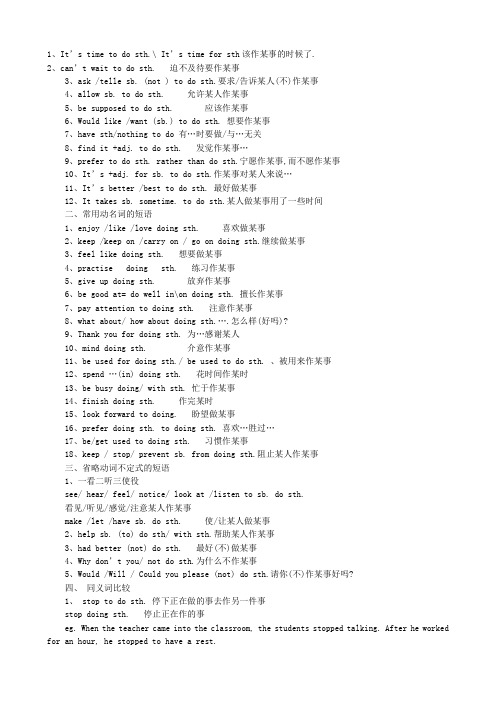
1、It’s time to do sth.\ It’s time for sth该作某事的时候了.2、can’t wait to do sth.迫不及待要作某事3、ask /telle sb. (not ) to do sth.要求/告诉某人(不)作某事4、allow sb. to do sth. 允许某人作某事5、be supposed to do sth. 应该作某事6、Would like /want (sb.) to do sth. 想要作某事7、have sth/nothing to do 有…时要做/与…无关8、find it +adj. to do sth. 发觉作某事…9、prefer to do sth. rather than do sth.宁愿作某事,而不愿作某事10、It’s +adj. for sb. to do sth.作某事对某人来说…11、It’s better /best to do sth. 最好做某事12、It takes sb. sometime. to do sth.某人做某事用了一些时间二、常用动名词的短语1、enjoy /like /love doing sth. 喜欢做某事2、keep /keep on /carry on / go on doing sth.继续做某事3、feel like doing sth. 想要做某事4、practise doing sth. 练习作某事5、give up doing sth. 放弃作某事6、be good at= do well in\on doing sth. 擅长作某事7、pay attention to doing sth. 注意作某事8、what about/ how about doing sth.….怎么样(好吗)?9、Thank you for doing sth. 为…感谢某人10、mind doing sth. 介意作某事11、be used for doing sth./ be used to do sth. 、被用来作某事12、spend …(in) doing sth.花时间作某时13、be busy doing/ with sth. 忙于作某事14、finish doing sth. 作完某时15、look forward to doing. 盼望做某事16、prefer doing sth. to doing sth. 喜欢…胜过…17、be/get used to doing sth. 习惯作某事18、keep / stop/ prevent sb. from doing sth.阻止某人作某事三、省略动词不定式的短语1、一看二听三使役see/ hear/ feel/ notice/ look at /listen to sb. do sth.看见/听见/感觉/注意某人作某事make /let /have sb. do sth. 使/让某人做某事2、help sb. (to) do sth/ with sth.帮助某人作某事3、had better (not) do sth. 最好(不)做某事4、Why don’t you/ not do sth.为什么不作某事5、Would /Will / Could you please (not) do sth.请你(不)作某事好吗?四、同义词比较1、 stop to do sth. 停下正在做的事去作另一件事stop doing sth. 停止正在作的事eg. When the teacher came into the classroom, the students stopped talking. After he worked for an hour, he stopped to have a rest.2、 forget / remember to do sth.忘记/记得要去作某事forget / remember doing sth.忘记记得曾经做过某事eg. Please remember to bring my book to school.I remember doing my homework3、 used to do sth. 过去常常作某事be used to do sth. 被用来作某事be used to doing sth. 习惯于作某事eg. My father used to smoke.Wood is used to make paper.I am used to getting up early.4、So +be/助动词/情态动词 + 主语…也一样So +主语+be/助动词/ 情态动词是呀,表示赞同别人的观点Neither + be /助动词/ 情态动词+主语…也不一样(用于否定句)eg. He has been to Beijing. So have I.It’s a fine day. So it i s.She doesn’t like eggs. Neither do I.5、too…to do sth.太…而不能…so +adj. /adv + that(从句) 如此…以致…such +(a/an +adj.)+n.+ that(从句)如此…以致…(not) enough (for sb.) to do sth.(对某人来说)做某事(不)够eg. The boy is too young to go to school.The boy is so young that he can’t go to school.He is such a young boy that he can’t go to school.The boy is not old enough to go to school.五、常考知识点1、keep +adj. 保持…状态keep (sb.) doing sth.继续做某事/使某人老是做某事eg. Everyone should keep our classroom clean.It’s too late, but he still keeps working.Lily always keeps us waiting for her.2、make+ sb. + n. 使某人成为make + sb. + adj. 使某人…make sb. do sth. 使某人做某事Sb. be made to sth. 某人被迫做某事eg. We made Peter our monitor.Books make us happy.He often makes me laugh.The workers were made to work 12 hours a day.3、I don’t think that我认为…不eg. I don’t think you are right.4、It’s /was/has been+ some time +since+一般过去时…自从…以来有多久了eg. It has been two years since we met last time.6、What do you mean by?=What does .. mean?=what is the meaning of...?是什么意思?eg. What do you mean by “computer”?=What does “computer”mean?=what is the meaning of "computer"?7、What do you think of…/How do you like …?你认为…怎么样?eg. What do you think of this film /How do you like this film?8、What is/was/will …be like? ..怎么样?eg. What is the weather like?What will the life in the future be like?9、It’s said/ reported that…据说/据报道It's well known that 众所周知It's thought that 大家认为eg. It’s said that the population of the word would be 6 billion in 2050.10、one of the +形容词最高级+名词复数…其中之一eg. Shanghai is one of the biggest cities in China.11、neither…nor… 既不…也不(两者都不),either…or…要么…要么/或者…或者/不是…就是not only…but also… 不但…而且以上三个词做主语时,要用就近原则eg. Neither you nor he has been to the USA.Either he or you go to the park.Not only my mother but also my father is a teacher.neither of 两者都不either of 两者选一none of 没有一个以上三个做主语时,谓语动词用单数All of 全部 Both of 两者都以上二个做主语时,谓语动词用复数12、比较级+ than +any other +名词单数…比其余任何一个…比较级+ than + the other+名词复数eg. Shanghai is bigger than any other city=shanghai is bigger than the other cities in China.13、When(当…的时候), if (如果), as soon as(一…就), until(直到…才), unless(除非/如果…不)这几个词引导的时间或条件状语从句时,主句要用一般将来时.从句一般现在时eg. I will call you when he comes.If it doesn’t rain tomorrow, we will have a picnic.As soon as I get to Beijing, I’ll come to see you.He won’t go to bed until his parents come back.Unless you work hard, you won’t catch up with others.。
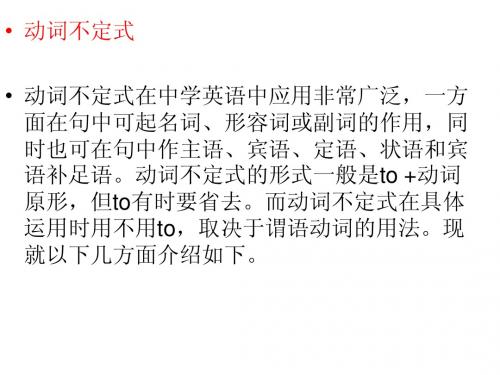
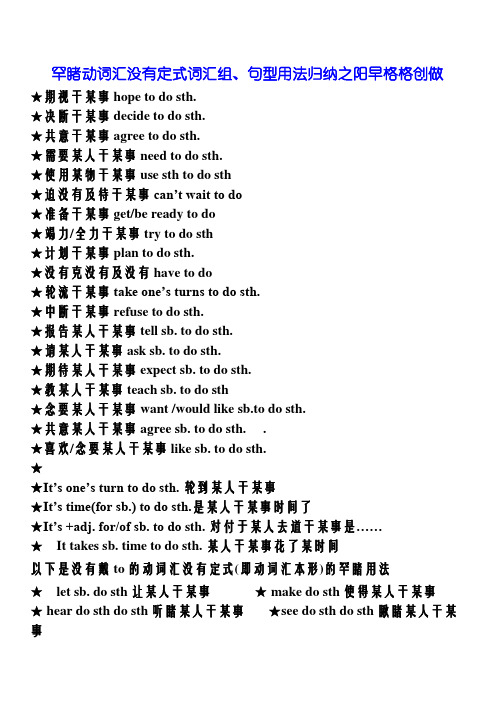
罕睹动词汇没有定式词汇组、句型用法归纳之阳早格格创做★期视干某事hope to do sth.★决断干某事decide to do sth.★共意干某事agree to do sth.★需要某人干某事need to do sth.★使用某物干某事use sth to do sth★迫没有及待干某事can’t wait to do★准备干某事get/be ready to do★竭力/全力干某事try to do sth★计划干某事plan to do sth.★没有克没有及没有have to do★轮流干某事take one’s turns to do sth.★中断干某事refuse to do sth.★报告某人干某事tell sb. to do sth.★请某人干某事ask sb. to do sth.★期待某人干某事expect sb. to do sth.★教某人干某事teach sb. to do sth★念要某人干某事want /would like sb.to do sth.★共意某人干某事agree sb. to do sth. .★喜欢/念要某人干某事 like sb. to do sth.★★It’s one’s turn to do sth. 轮到某人干某事★It’s time(for sb.) to do sth.是某人干某事时间了★It’s +adj. for/of sb. to do sth. 对付于某人去道干某事是……★ It takes sb. time to do sth. 某人干某事花了某时间以下是没有戴to的动词汇没有定式(即动词汇本形)的罕睹用法★ let sb. do sth让某人干某事★ make do sth使得某人干某事★ hear do sth do sth听睹某人干某事★see do sth do sth瞅睹某人干某事★ why not 或者why don’t you +动词汇本形?为什么没有….?(表示修议)★某人+had better( not)do 某人最佳(没有)干某事★情态动词汇can/may /must /should+ 动词汇本形(包罗情态动词汇的可定形式+动词汇本形)★ be going to + 动词汇本形(表示“将要”“挨算” 干某事)5.正在以下结构中加ing1. enjoy doing sth 喜欢干某事;2. finish doing sth;完毕干某事;3. feel like doing sth 念要干某事;4. stop doing sth 停行干某事(本去的事)5. forget doing sth 记记干过某事;6. go on doing sth 继承干某事(本去的事);7. remember doing sth 记得干过某事;8. like doing sth 喜欢干某事;9. find /see/hear/watch sb doing创造/瞅到/听到/瞅瞅某人干10. try doing sth 试图干某事;11. need doing sth 需要干某事;12. prefer doing sth 宁愿干某事;13. mind doing sth 介意干某事;14. miss doing sth 错过干某事;15. practice doing sth 训练干某事;16. be busy doing sth 闲于干某事;17. can't help doing sth 禁没有住干某事;18. waste time/money doing 浪费时间/款项干…;19. keep sb.doing 让…末究/向去干…20. stop sb.(from)doing 遏行某人干某事21. prefer doing a to doing b=like A better than b22. “do some +doing”短语如:do some shopping/do some washing/do some reading/do some practicing/do some cleaning/do some speaking23.“go doing”短语去干某事(主要指文娱活动等)如:go shopping/go fishing/go swimming/go hiking/go skating/go camping/go skiing(滑雪/go boating /go hunting (挨猎)。
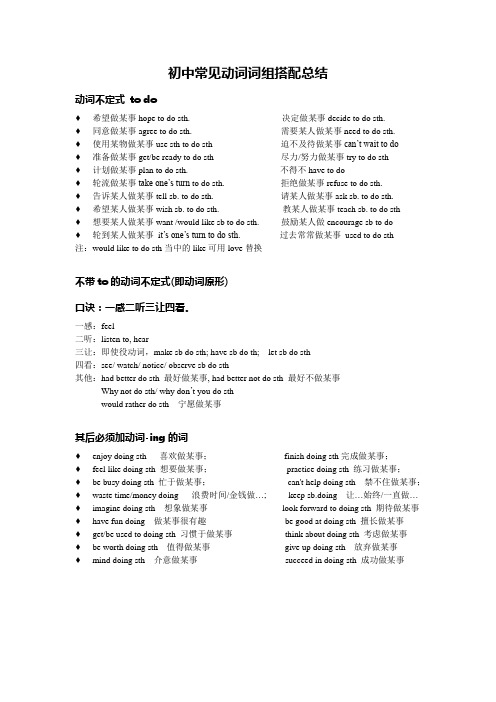
初中常见动词词组搭配总结动词不定式 to do♦希望做某事hope to do sth. 决定做某事decide to do sth.♦同意做某事agree to do sth. 需要某人做某事need to do sth.♦使用某物做某事use sth to do sth 迫不及待做某事can’t wait to do♦准备做某事get/be ready to do sth 尽力/努力做某事try to do sth♦计划做某事plan to do sth. 不得不have to do♦轮流做某事take one’s turn to do sth. 拒绝做某事refuse to do sth.♦告诉某人做某事tell sb. to do sth. 请某人做某事ask sb. to do sth.♦希望某人做某事wish sb. to do sth. 教某人做某事teach sb. to do sth♦想要某人做某事want /would like sb to do sth. 鼓励某人做encourage sb to do♦轮到某人做某事 i t’s one’s turn to do sth.过去常常做某事used to do sth注:would like to do sth当中的like可用love替换不带to的动词不定式(即动词原形)口诀:一感二听三让四看。
一感:feel二听:listen to, hear三让:即使役动词,make sb do sth; have sb do th; let sb do sth四看:see/ watch/ notice/ observe sb do sth其他:had better do sth 最好做某事, had better not do sth 最好不做某事Why not do sth/ why don’t you do sthwould rather do sth 宁愿做某事其后必须加动词-ing的词♦enjoy doing sth 喜欢做某事; finish doing sth完成做某事;♦feel like doing sth 想要做某事;practice doing sth 练习做某事;♦be busy doing sth 忙于做某事;can't help doing sth 禁不住做某事;♦waste time/money doing 浪费时间/金钱做…; keep sb.doing 让…始终/一直做…♦imagine doing sth 想象做某事look forward to doing sth 期待做某事♦have fun doing 做某事很有趣be good at doing sth 擅长做某事♦get/be used to doing sth 习惯于做某事think about doing sth 考虑做某事♦be worth doing sth 值得做某事give up doing sth 放弃做某事♦mind doing sth 介意做某事succeed in doing sth 成功做某事3.11 早读听写的单词1. 主动提出做某事offer to do sth2. 义务工作voluntary work3. 做某事有困难have difficulty/trouble/problems doing sth4. 不能做某事be unable to do sth/ isn’t able to do sth5. 打起精神;振作精神raise one’s spirits6. 继续做某事continue to do sth/ continue doing sth7. 发生take place8. 给某人留下好的印象leave/ make a good impression on sb9. 提醒某人某事;使某人想起某事remind sb of/about sth10. 需要帮助的in need3.11 早读听写的单词1. 主动提出做某事offer to do sth2. 义务工作voluntary work3. 做某事有困难have difficulty/trouble/problems doing sth4. 不能做某事be unable to do sth/ isn’t able to do sth5. 打起精神;振作精神raise one’s spirits6. 继续做某事continue to do sth/ continue doing sth7. 发生take place8. 给某人留下好的印象leave/ make a good impression on sb9. 提醒某人某事;使某人想起某事remind sb of/about sth10. 需要帮助的in need3.11 早读听写的单词1. 主动提出做某事offer to do sth2. 义务工作voluntary work3. 做某事有困难have difficulty/trouble/problems doing sth4. 不能做某事be unable to do sth/ isn’t able to do sth5. 打起精神;振作精神raise one’s spirits6. 继续做某事continue to do sth/ continue doing sth7. 发生take place8. 给某人留下好的印象leave/ make a good impression on sb9. 提醒某人某事;使某人想起某事remind sb of/about sth10. 需要帮助的in need。
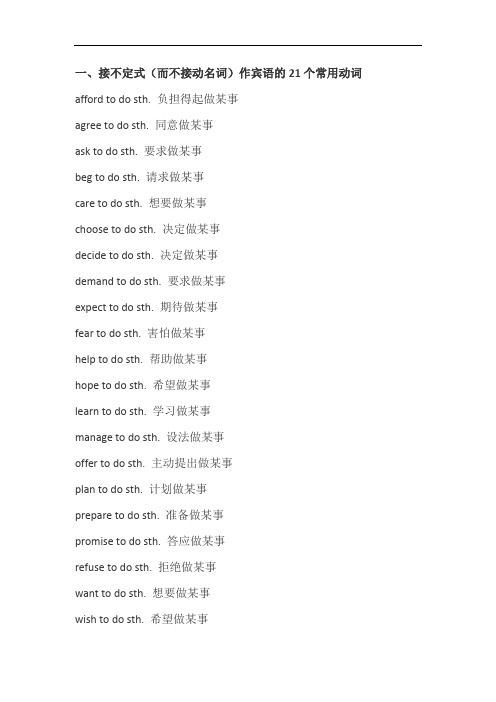
一、接不定式(而不接动名词)作宾语的21个常用动词afford to do sth. 负担得起做某事agree to do sth. 同意做某事ask to do sth. 要求做某事beg to do sth. 请求做某事care to do sth. 想要做某事choose to do sth. 决定做某事decide to do sth. 决定做某事demand to do sth. 要求做某事expect to do sth. 期待做某事fear to do sth. 害怕做某事help to do sth. 帮助做某事hope to do sth. 希望做某事learn to do sth. 学习做某事manage to do sth. 设法做某事offer to do sth. 主动提出做某事plan to do sth. 计划做某事prepare to do sth. 准备做某事promise to do sth. 答应做某事refuse to do sth. 拒绝做某事want to do sth. 想要做某事wish to do sth. 希望做某事注:有些不及物动词后习惯上也接不定式,不接动名词:aim to do sth. 打算做某事fail to do sth. 未能做某事long to do sth. 渴望做某事happen to do sth. 碰巧做某事二、接不定式作宾补的30个常用动词advise sb. to do sth. 建议某人做某事allow sb. to do sth. 允许某人做某事ask sb. to do sth.请(叫)某人做某事beg sb. to do sth. 请求某人做某事cause sb. to do sth. 导致某人做某事drive sb. to do sth .驱使某人做某事encourage sb. to do sth. 鼓励某人做某事expect sb. to do sth. 期望某人做某事force sb. to do sth. 强迫某人做某事get sb. to do sth. 使(要)某人做某事hate sb. to do sth. 讨厌某人做某事help sb. to do sth. 帮助某人做某事invite sb. to do sth. 邀请某人做某事leave sb. to do sth. 留下某人做某事like sb. to do sth. 喜欢某人做某事mean sb. to do sth. 打算要某人做某事need sb. to do sth. 需要某人做某事order sb. to do sth. 命令某人做某事permit sb. to do sth. 允许某人做某事prefer sb. to do sth. 宁愿某人做某事request sb. to do sth. 要求某人做某事remind sb. to do sth. 提醒某人做某事teach sb. to do sth .教某人做某事tell sb. to do sth. 告诉某人做某事train sb. to do sth. 训练某人做某事trouble sb. to do sth. 麻烦某人做某事want sb. to do sth. 想要某人做某事warn sb. to do sth. 警告某人做某事wish sb. to do sth. 希望某人做某事三)接不定式或动名词作宾语意思不同的7个动词(1) remember to do sth. 记住要做某事remember doing sth. 记住曾做过某事(2) forget to do sth. 忘记要做某事forget doing sth. 忘记曾做过某事(3) regret to do sth. 后悔(遗憾)要做某事regret doing sth. 后悔(遗憾)曾做过某事(4) try to do sth. 设法要做某事try doing sth. 做某事试试看有何效果(5) mean to do sth. 打算做某事mean doing sth. 意味着做某事(6) can’t help to do sth. 不能帮助做某事can’t help doing sth. 禁不住做某事(7) go on to do sth. 做完某事后接着做另一事go on doing sth. 继续做一直在做的事注:stop to do sth. 与stop doing sth.也不同,前者指停下来去做某事,后者指停止正在做的事,但stop to do sth. 中的不定式不是宾语,是目的状语。

动词不定式作宾语动词不定式作宾语,表明意图,希望或决定的内容。
1、有些及物动词如afford,need,agree,ask,decide,choose,hope,offer,plan,hate,refuse等用不定式作宾语,结构为“动词+不定式”。
如:He offered to help me.他表示愿意帮助我。
He decided to buy a new car.他决定买辆新车。
2、有些动词如ask,help,like,love,need,prefer,want,choose 等除了可以用不定式作宾语,还可以用不定式作补语,即:动词+宾语+不定式,如:I like you to keep everything tidy.我喜欢你把每件东西都保持得整洁。
3、有些动词或动词词组如:decide,know,show,tell,forget,remember,learn,find out等可以用“疑问词+不定式”结构作宾语。
如:Please show us how to do that.请给我们演示一下如何去做。
They haven’t decided whether to accept the invitation.他们还没决定是否接受邀请。
4、Sb. find/feel/think/+it+adj./n.+to do sth.句型中it是形式宾语,真正的宾语是后面的动词不定式。
如:The man downstairs found it difficult to get to sleep.楼下的人发觉难以入睡。
I feel it my duty to help them.我感到帮助他们是我的责任。
5、动词forget,remember,stop,go on等之后接v-ing形式和不定式作宾语意义差别较大。
如:stop to do sth.停下来去做某事Stop doing sth.停止做某事Remember to do sth.记得去做某事Remember doing sth.记得做过某事。
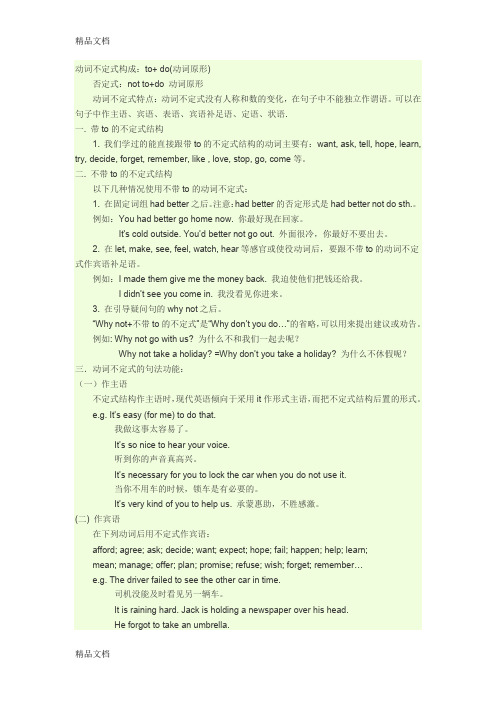
动词不定式构成:to+ do(动词原形)否定式:not to+do 动词原形动词不定式特点:动词不定式没有人称和数的变化,在句子中不能独立作谓语。
可以在句子中作主语、宾语、表语、宾语补足语、定语、状语.一. 带to的不定式结构1. 我们学过的能直接跟带to的不定式结构的动词主要有:want, ask, tell, hope, learn, try, decide, forget, remember, like , love, stop, go, come等。
二. 不带to的不定式结构以下几种情况使用不带to的动词不定式:1. 在固定词组had better之后。
注意:had better的否定形式是had better not do sth.。
例如:You had better go home now. 你最好现在回家。
It's cold outside. You’d better not go out. 外面很冷,你最好不要出去。
2. 在let, make, see, feel, watch, hear等感官或使役动词后,要跟不带to的动词不定式作宾语补足语。
例如:I made them give me the money back. 我迫使他们把钱还给我。
I didn’t see you come in. 我没看见你进来。
3. 在引导疑问句的why not之后。
“Why not+不带to的不定式”是“Why don’t you do…”的省略,可以用来提出建议或劝告。
例如: Why not go with us? 为什么不和我们一起去呢?Why not take a holiday? =Why don’t you take a holiday? 为什么不休假呢?三.动词不定式的句法功能:(一)作主语不定式结构作主语时,现代英语倾向于采用it作形式主语,而把不定式结构后置的形式。
e.g. It’s easy (for me) to do that.我做这事太容易了。
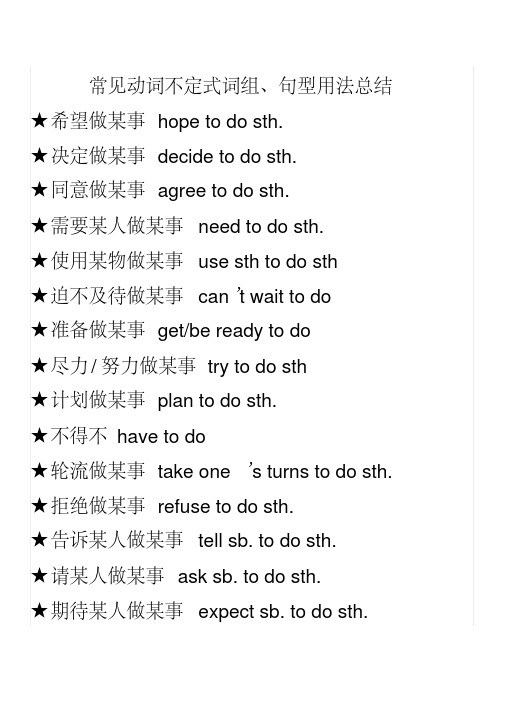
常见动词不定式词组、句型用法总结★希望做某事hope to do sth.★决定做某事decide to do sth.★同意做某事agree to do sth.★需要某人做某事need to do sth.★使用某物做某事use sth to do sth★迫不及待做某事can’t wait to do★准备做某事get/be ready to do★尽力/努力做某事try to do sth★计划做某事plan to do sth.★不得不have to do★轮流做某事take one’s turns to do sth.★拒绝做某事refuse to do sth.★告诉某人做某事tell sb. to do sth.★请某人做某事ask sb. to do sth.★期待某人做某事expect sb. to do sth.★教某人做某事teach sb. to do sth★想要某人做某事want /would like sb.to do sth.★同意某人做某事agree sb. to do sth..★喜欢/想要某人做某事like sb. to do sth.★帮助某人做某事help sb. to do sth/helpsb.do★It’s one’s turn to do sth. 轮到某人做某事★It’s time(for sb.) to do sth.是某人做某事时候了★It’s +adj. for/of sb. to do sth. 对于某人来说做某事是……★It takes sb. time to do sth. 某人做某事花了某时间以下是不带to的动词不定式(即动词原形)的常见用法★let sb. do sth让某人做某事★make do sth使得某人做某事★hear do sth do sth听见某人做某事★see do sth do sth看见某人做某事★why not 或why don’t you +动词原形?为什么不….?(表示建议)★某人+had better( not)do 某人最好(不)做某事★情态动词can/may /must /should+ 动词原形(包括情态动词的否定形式+动词原形)★be going to + 动词原形(表示“即将”“打算”做某事)5.在以下结构中加ing1.enjoy doing sth喜欢做某事;2.finish doing sth;完成做某事;3.feel like doing sth 想要做某事;4.stop doing sth停止做某事(原来的事)5.forget doing sth忘记做过某事;6.go on doing sth继续做某事(原来的事);7.remember doing sth 记得做过某事;8.like doing sth喜欢做某事;9.find /see/hear/watch sb doing发现/看到/听到/观看某人做10.try doing sth试图做某事;11.need doing sth需要做某事;12.prefer doing sth 宁愿做某事;13.mind doing sth 介意做某事;14.miss doing sth 错过做某事;15.practice doing sth 练习做某事;16.be busy doing sth 忙于做某事;17.can't help doing sth禁不住做某事;18. waste time/money doing 浪费时间/金钱做…;19. keep sb.doing 让…始终/一直做…阻止某人做某事20. stop sb.(from)doing21. prefer doing a to doing b=like A better than b短语22. “do some +doing”如:do some shopping/do some washing/do some reading/do some practicing/do some cleaning/do some speaking短语去做某事(主要指文娱活动等)23.“go doing”如:go shopping/go fishing/go swimming/go hiking/go skating/go camping/go skiing(滑雪/go boating /go hunting (打猎)。
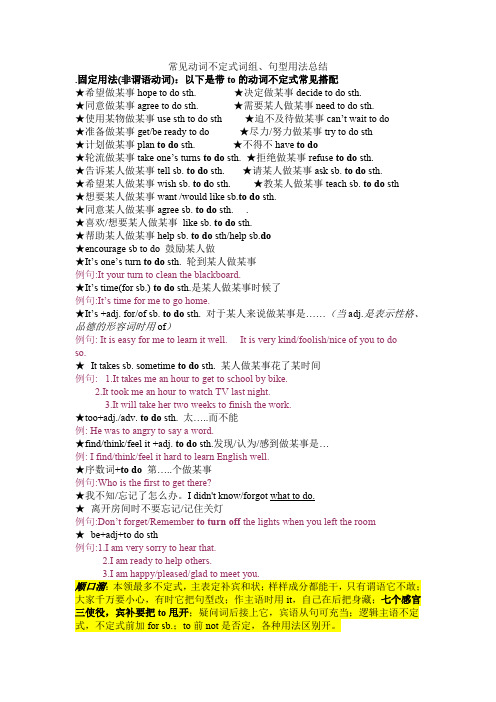
常见动词不定式词组、句型用法总结.固定用法(非谓语动词):以下是带to的动词不定式常见搭配★希望做某事hope to do sth. ★决定做某事decide to do sth.★同意做某事agree to do sth. ★需要某人做某事need to do sth.★使用某物做某事use sth to do sth ★迫不及待做某事can’t wait to do★准备做某事get/be ready to do ★尽力/努力做某事try to do sth★计划做某事plan to do sth. ★不得不have to do★轮流做某事take one’s turns to do sth. ★拒绝做某事refuse to do sth.★告诉某人做某事tell sb. to do sth. ★请某人做某事ask sb. to do sth.★希望某人做某事wish sb. to d o sth. ★教某人做某事teach sb. to do sth★想要某人做某事want /would like sb.to do sth.★同意某人做某事agree sb. to do sth. .★喜欢/想要某人做某事like sb. to do sth.★帮助某人做某事help sb. to do sth/help sb.do★encourage sb to do 鼓励某人做★It’s one’s turn to do sth. 轮到某人做某事例句:It your turn to clean the blackboard.★It’s time(for sb.) to do sth.是某人做某事时候了例句:It’s time for me to go home.★It’s +adj. for/of sb. to do sth. 对于某人来说做某事是……(当adj.是表示性格、品德的形容词时用of)例句: It is easy for me to learn it well. It is very kind/foolish/nice of you to doso.★It takes sb. sometime to do sth. 某人做某事花了某时间例句: 1.It takes me an hour to get to school by bike.2.It took me an hour to watch TV last night.3.It will take her two weeks to finish the work.★too+adj./adv. to do sth. 太…..而不能例: He was to angry to say a word.★find/think/feel it +adj. to do sth.发现/认为/感到做某事是…例: I find/think/feel it hard to learn English well.★序数词+to do第…..个做某事例句:Who is the first to get there?★我不知/忘记了怎么办。

英语动词不定式大全 动词不定式是一种活跃的非谓语动词。
它在句中起的是名词。
形容词或副词的作 用, 可在句子中作主语。
宾语。
定语。
状语和宾语补足语。
动词不定式的形式是 "to + 动词原形 ", 但 to 有时要省去。
动词不定式在具体运用时 , 用不用 to, 取决 于谓语动词的用法 :一。
带 to 的不定式结构1. 我们学过的能直接跟带 to 的不定式结构的动词主要有 :want, ask, tell, hope, learn, try, decide, forget, remember, like ,love, stop, go, come 等。
2. 动词不定式的否定形式是在不定式前直接加 not, 即 not to do sth. 。
例 如: Jim told me not to wake up Kate. 吉姆告诉我别叫醒凯特。
二。
不带 to 的不定式结构以下几种情况使用不带 to 的动词不定式 :1. 在固定词组had better 之后。
注意:had better 的否定形式是had better not do sth. 。
例如 :You had better go home now. 你最好现在回家。
It's cold outside. You'd better not go out. 外面很冷 , 你最好不要出去。
2. 在 let,make,see, feel, watch,hear 等感官或使役动词后 , 要跟不带 to 的动词不定式作宾语补足语。
例如 :I made them give me the money back. 我迫使他们把钱还给我。
I didn't see you come in. 我没看见你进来。
3. 在引导疑问句的 why not 之后。
"Why not+不带to 的不定式"是 Why don't you do …的省略,可以用来提出 建议或劝告。

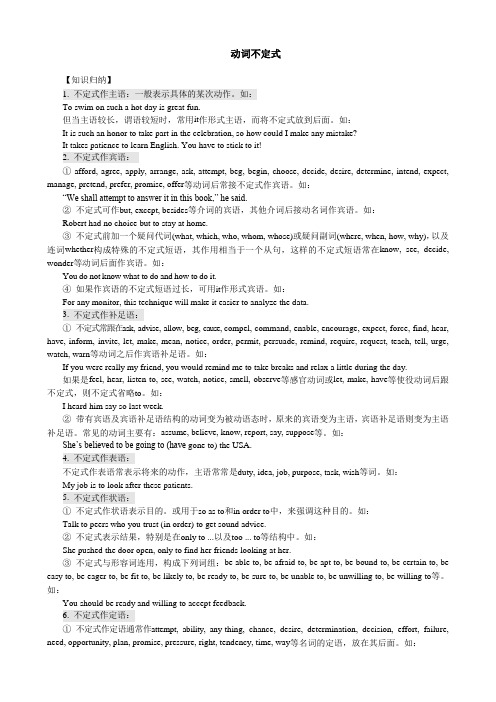
动词不定式【知识归纳】1. 不定式作主语:一般表示具体的某次动作。
如:To swim on such a hot day is great fun.但当主语较长,谓语较短时,常用it作形式主语,而将不定式放到后面。
如:It is such an honor to take part in the celebration, so how could I make any mistake?It takes patience to learn English. You have to stick to it!2. 不定式作宾语:① afford, agree, apply, arrange, ask, attempt, beg, begin, choose, decide, desire, determine, intend, expect, manage, pretend, prefer, promise, offer等动词后常接不定式作宾语。
如:“We shall attempt to answer it in this book,” he said.②不定式可作but, except, besides等介词的宾语,其他介词后接动名词作宾语。
如:Robert had no choice but to stay at home.③不定式前加一个疑问代词(what, which, who, whom, whose)或疑问副词(where, when, how, why),以及连词whether构成特殊的不定式短语,其作用相当于一个从句,这样的不定式短语常在know, see, decide, wonder等动词后面作宾语。
如:You do not know what to do and how to do it.④如果作宾语的不定式短语过长,可用it作形式宾语。
如:For any monitor, this technique will make it easier to analyze the data.3. 不定式作补足语:①不定式常跟在ask, advise, allow, beg, cause, compel, command, enable, encourage, expect, force, find, hear, have, inform, invite, let, make, mean, notice, order, permit, persuade, remind, require, request, teach, tell, urge, watch, warn等动词之后作宾语补足语。
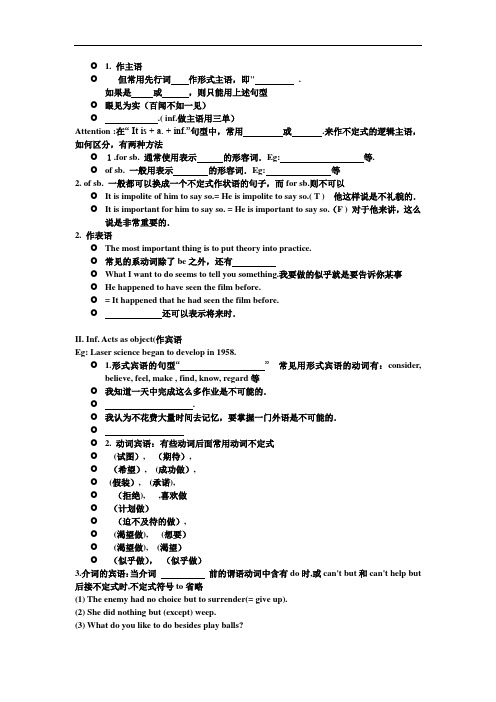
1. 作主语但常用先行词作形式主语,即" .如果是或,则只能用上述句型眼见为实(百闻不如一见).( inf.做主语用三单)Attention :在“ It is + a. + inf.”句型中,常用或.来作不定式的逻辑主语,如何区分,有两种方法1.for sb. 通常使用表示的形容词.Eg: 等.of sb. 一般用表示的形容词.Eg: 等2. of sb. 一般都可以换成一个不定式作状语的句子,而for sb.则不可以It is impolite of him to say so.= He is impolite to say so.( T )他这样说是不礼貌的. It is important for him to say so. = He is important to say so.(F ) 对于他来讲,这么说是非常重要的.2. 作表语The most important thing is to put theory into practice.常见的系动词除了be之外,还有What I want to do seems to tell you something.我要做的似乎就是要告诉你某事He happened to have seen the film before.= It happened that he had seen the film before.还可以表示将来时.II. Inf. Acts as object(作宾语Eg: Laser science began to develop in 1958.1.形式宾语的句型“”常见用形式宾语的动词有:consider,believe, feel, make , find, know, regard等我知道一天中完成这么多作业是不可能的..我认为不花费大量时间去记忆,要掌握一门外语是不可能的.2. 动词宾语:有些动词后面常用动词不定式(试图), (期待),(希望), (成功做),(假装), (承诺),(拒绝), ,喜欢做(计划做)(迫不及待的做),(渴望做), (想要)(渴望做), (渴望)(似乎做),(似乎做)3.介词的宾语:当介词前的谓语动词中含有do时,或can't but和can't help but 后接不定式时,不定式符号to省略(1) The enemy had no choice but to surrender(= give up).(2) She did nothing but (except) weep.(3) What do you like to do besides play balls?(4) There was nothing for the students to do except read the books aloud.前后成分要对等,如果前面是inf. 后面的inf.可以省略to.III. Inf. Acts as complement (用作补足语)1. 动词宾语的补足语在后的宾语补足语要省略to; 和后的可省也可不省to 2.主语的补足语主语补足语的to不省略,被动语态Eg: The room was said to have been cleaned.=AttentionIV. Inf. Acts as indicating purpose/ result(表示目的和结果)不定式还可放在句首或用不定式修饰动词、形容词和副词表示结果: 结构Attention1. only+ 不定式/never+ to do 表示2. “too…to ”如果形容词是时,表示“非常”V. Inf. 作定语都应放在它所修饰的名词或代词后面1. 后的名词常用inf作定语2. 句型Inf. 做后置定语3.但当inf.修饰的是时,介词可省4.inf. 做表示将来时VI. 疑问词+不定式Why not + V.原形Eg: ---- I usually go there by train.---- Why not ___ by boat for a change?A. to try goingB.trying to goC.to try and goD.try goingVII. 不定式的完成式,被动式,进行式1. 被动式2. 完成式:3. 进行式:Inf. 的被动形式1.2. Inf.中,句中主语与inf. 构成,用主动.3. 中,用主动4. be to blame 词组中,表示“”Inf.的省略:等可以在句中作为独立成分. Inf.固定词组句型1.2.3.4.5.。
常见动词不定式词组、句型用法总结 .固定用法(非谓语动词):以下是带to的动词不定式常见搭配★希望做某事hope to do sth. ★决定做某事decide to do sth.★同意做某事agree to do sth. ★需要某人做某事need to do sth.★使用某物做某事use sth to do sth ★迫不及待做某事can’t wait to do★准备做某事get/be ready to do ★尽力/努力做某事try to do sth★计划做某事plan to do sth. ★不得不have to do★轮流做某事take one’s turns to do sth. ★拒绝做某事refuse to do sth.★告诉某人做某事tell sb. to do sth. ★请某人做某事ask sb. to do sth.★希望某人做某事wish sb. to do sth.★想要某人做某事want /would like sb. to do sth.★同意某人做某事agree sb. to do sth.★教某人做某事teach sb. to do sth.★喜欢/想要某人做某事 like sb. to do sth.★帮助某人做某事help sb. to do sth/help sb.do★encourage sb to do 鼓励某人做★It’s one’s turn to do sth. 轮到某人做某事例句:It your turn to clean the blackboard.★It’s time(for sb.) to do sth.是某人做某事时候了★例句:It’s time for me to go home.★★It’s +adj. for/of sb. to do sth. 对于某人来说做某事是……(当adj.是表示性格、品德的形容词时用of)例句: It is easy for me to learn it well. It is very kind/foolish/nice of you to do so.★ It takes sb. sometime to do sth. 某人做某事花了某时间例句: 1.It takes me an hour to get to school by bike.2.It took me an hour to watch TV last night.3.It will take her two weeks to finish the work.★too+adj./adv. to do sth. 太…..而不能例: He was too angry to say a word.★find/think/feel it +adj. to do sth.发现/认为/感到做某事是…例: Ifind/think/feel it hard to learn English well.★序数词+to do 第…..个做某事例句:Who is the first to get there?★我不知/忘记了怎么办。
I didn't know/forgot what to do.★离开房间时不要忘记/记住关灯例句:Don’t forget/Remember to turnoff the lights when you left the room★ be+adj+to do sth 例句:I am very sorry to hear that. I am ready to help others. I am happy/pleased/glad to meet you.顺口溜:本领最多不定式,主表定补宾和状;样样成分都能干,只有谓语它不敢;大家千万要小心,有时它把句型改;作主语时用it,自己在后把身藏;七个感官三使役,宾补要把to甩开;疑问词后接上它,宾语从句可充当;逻辑主语不定式,不定式前加for sb.;to前not是否定,各种用法区别开。
以下是不带to的动词不定式(即动词原形)的常见用法★ let sb. do sth让某人做某事★ make do sth使得某人做某事★ hearsb do sth听见某人做某事★see sb do sth看见某人做某事★ why not 或why don’t you +动词原形?为什么不….?(表示建议)例:Why not/Why don’t you take a walk?★某人+had better( not)do 某人最好(不)做某事★情态动词can/may /must /should+ 动词原形(包括情态动词的否定形式+动词原形)★助动词do/does/did/will/would在构成疑问句或者构成否定句即don’t /doesn’t /didn’t /will not /would not+ 动词原形★ be going to + 动词原形(表示“即将”“打算”做某事)★主语+及物动词+名词/代词+不带的to的动词不定式说明:用于本句型的动词不定式有两类:一是感官动词see, find,hear, notice, watch, smell, observe, look at, listen to等;二是某些使役动词,如let, make, have等。
例:a)I‘ve never known him tell lies.我从来没有听说他说谎。
b)Mother let me go to camp.母亲让我去参加露营。
★只能是doing sth1、 enjoy doing sth[]享受做某事2、 finish doing sth[]结束做某事3、 practice doing sth[]练习做某事4、 mind doing sth []介意某事5、 be busy doing sth []忙于做某事6、 have fun doing sth []很开心做某事7、 have problems doing sth []有问题做某事 8、 have difficulties doing sth []有困难做某事9、 have trouble doing sth[]有麻烦做某事 10、 spend some time doing sth []花时间做某事11、 prefer doing sth to doing sth []更喜欢做某事 12、 be used to doing sth []习惯于做某事 13、 look forward to doing sth []盼望做某事 14、 be interested in doing sth []有兴趣做某事★只能是to do sth15、 want to do sth []想要 16、 would like to do []愿意17、 agree to do []同意 18、 refuse to do []拒绝19、 decide to do []决定 20、 plan to do[]计划21、 expect to do[]期望 22、 hope to do[]希望23、 wish to do[]但愿★to do doing 均可,但意思不一样24、 like to do sth[]喜欢马上去做某事 25、 like doing sth []平常喜欢做某事26、 prefer to do sth []更喜欢马上去做某事 27、 prefer doing sth []平常更喜欢做某事28、 hate to do []不喜欢马上去做某事 29、 hate doing sth[]平常不喜欢做某事30、 try to do sth []尽力去做某事 31、 try doing sth []试着去做某事32、 remember to do sth []记得去做某事 33、 remember doing sth []记得做过某事34、 forget to do sth []忘记去做某事 35、 forget doing sth []忘记做过某事36、 stop to do sth []停下来去做某事 37、 stop doing sth []停下正做的事★V+sb+to do sth结构38、 would like sb to do sth[]愿意某人去做某事 39、 like sb to do sth[]喜欢某人去做某事40、 want sb to do sth []想要某人去做某事 41、 wish sb to do sth []但愿某人去做某事42、 expect sb to do sth []期盼某人去做某事 43、 prefer sb to do sth []更喜欢某人去做某事 44、 allow sb to do sth []同意某人去做某事 45、encourage sb to do sth []鼓励某人去做某事 46、 advise sb to do sth []建议某人去做某事 47、 ask sb to do sth []要求某人去做某事48、 tell sb to do sth []告诉某人去做某事 49、 get sb to do sth[]使得某人去做某事50、 invite sb to do sth []邀请某人去做某事★特殊结构51、 make sb do sth[]让某人去做某事 52、 let sb do sth[]让某人去做某事53、 have sb do sth[]让某人去做某事 54、 help sb to do sth[]帮助某人去做某事55、 help sb do sth[]帮助某人去做某事★其他结构56、 stop sb from doing sth[]阻止某人去做某事 57、 stop sb doing sth[]阻止某人去做某事58、 keep sb doing sth[]让某人一直做某事 59、 keep sb from doing sth[]阻止某人去做某事 60、 get sth done[]让某事被做 61、 have it repaired[]让这个东东被修理62、 have my ears pierced[]让我的耳朵穿孔 63、 have my hair cut[]让我的头发被剪64、 health healthy healthily[]健康n 健康的adj 健康地adv65、 weight himself[]自已量体重 66、 daily walk[]每天的散步67、 monthly meeting[]每月的会议68、 clever bright wise[]聪明的adj 聪胆伶俐的adj 见多识广的adj69、 must be[]一定是70、 at least[]至少n71、 cigarette[]香烟n72、 hamburger[]汉堡n73、 chocolate[]巧克力n74、 wonder[]想知道v75、 ask for permission[]请求同意76、 surprisingly[]令人意外地adv77、 the best route[]最好的路线78、 as the days grow shorter and colder[]随着天气越变越冷79、 normally casually actually[]正常地adv 随意地adv 事实上adv80、 crowded awful[]拥挤的adj 糟糕的adj81、 urge[]敦促v 82、 since[]因为conj 自从conj83、 make it worse[]使之更差 84、 treat []治疗v 对待v85、 heal[]医治n。